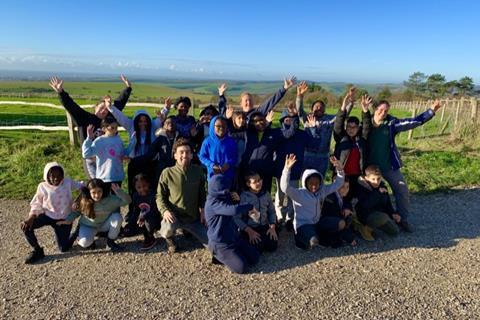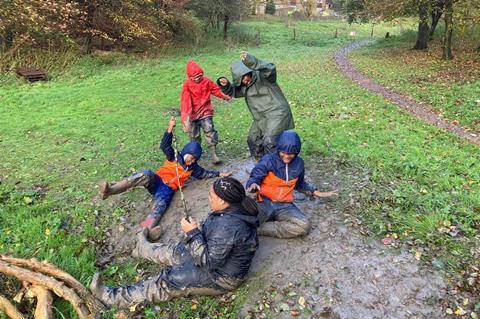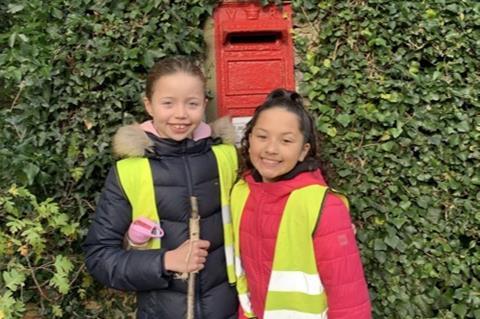The Garden Classroom shares how they brought together children from north east London for their Winter Residentials.

The Garden Classroom (TGC) provides urban children with transformative outdoor experiences. It’s the second year the charity has invited city schools to take part in their Winter Residentials in the South Downs National Park. They worked in partnership with the South Downs Trust to make them happen, inviting 53 pupils in Years 5 and 6 from Moreland Primary (Islington) and Nightingale Primary (Hackney) to immerse themselves in the outdoors.
TGC’s countryside manager Millie Darling reports back…
The children and adults loved hiking in the South Downs and learning how to read maps and understand what a national park is. We were lucky to have many clear night skies for star gazing and they also enjoyed whittling walking staffs and cooking on campfires. Teachers from both schools commented on how being on the residential brought the children together and facilitated friendships and collaboration that wouldn’t happen in the same way at school.
Skills learnt on the hike
Before the hike children chose a hazel walking staff and whittled patterns, creating handles for their cane with sisal string (using a Forest School method called whipping). Children then drew pictures of their view over the South Downs from the hostel on postcards and wrote messages to all their family and friends back at home.

They worked in small groups with a TGC facilitator to look at OS maps of the South Downs National Park and understand features on the maps such as contour lines.
“Winter residentials are a great way to teach the children to be outdoors in all weather and bond the class at the start of the academic year.”
Teacher comment
During the walk, children navigated using the maps along with a compass, as well as natural navigation methods such as noticing the direction the trees have grown in (bent to the north because of the strong wind from the sea in the south), noticing the side of the tree the moss has grown on (normally north), and creating shadow sticks (putting a stick in the ground and marking the movement of the shadow over 30 mins to know the directions).
The walk to the post-box involved walking up and down hills and provided many opportunities for learning about the ecology of the national park, as well as ample opportunities for stopping for snacks and games and rolling down the hill. Children felt a great sense of achievement and pride when they posted their postcards after the challenging walk.

Nature crafts and campfires
The groups took part in a range of nature crafts using locally sourced materials including making elder beads (harvesting elder using secateurs and using a peg to remove the pithy centre) and weaving using rushes.
They also chopped wood for making campfires using a billhook. They were taught how to light a fire using a fire steel and then build up the fire using tinder, kindling and logs. Small groups of children with a TGC facilitator built small fires which they then used to cook Campfire Hotdogs (bread and sausages cooked on sticks over the fire) and S’mores.
“The children built friendships they may not have done at school. They also learnt outdoors skills which they can continue to develop now they are home.”
Teacher comment
During the evenings the children joined a campfire in the dark and told stories and sung songs linked to nature. After the campfire they lay on tarpaulins with blankets and hot chocolate to stargaze.
We identified the Plough and the North Star and linked this to navigation activities in the daytime. We also identified other constellations including Orion, Cassiopeaia, and the Seven Sisters.
The Charity’s focus on wellbeing
Millie at TGC explained: “All activities at TGC residentials focus on children’s wellbeing and our highly-trained trauma-informed facilitators work with the school teachers to constantly assess what the children need and how we can respond flexibly to create a memorable life-changing experience for the children that enables them to develop a deep connection with nature.
“Many teachers tell us that children who normally display challenging behaviour in the classroom setting behave in a positive way at TGC residentials and build lasting friendships that they then take back to school.”
For more information go to www.thegardenclassroom.org.uk.










